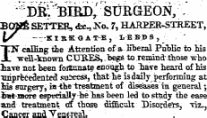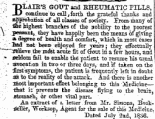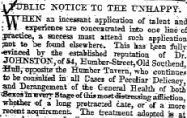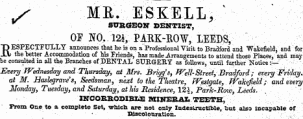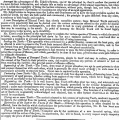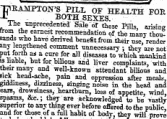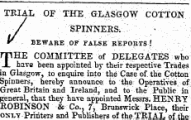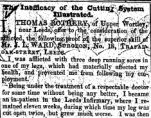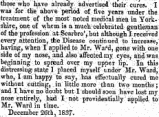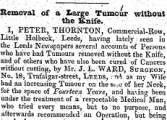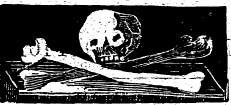On this page
- Departments (1)
- Adverts (14)
- Pictures (3)
-
Text (3)
-

NEW PGOR-LAW-^PTJBLIG MEET*. ¦: V: ING AT BUM, ¦
-

Untitled Article
-

Untitled Article
Note: This text has been automatically extracted via Optical Character Recognition (OCR) software. The text has not been manually corrected and should not be relied on to be an accurate representation of the item.
-
-
Transcript
-
Note: This text has been automatically extracted via Optical Character Recognition (OCR) software. The text has not been manually corrected and should not be relied on to be an accurate representation of the item.
Additionally, when viewing full transcripts, extracted text may not be in the same order as the original document.
Untitled Ad
i / * GRATIS i GRATIS ! ] M - ¦ :- —— - t - ' . ' ^ .- . A Ijf ALMANAC will be ^ ven to every ooe whto I Ltt . Porcliases the H Northern Star , "'or the ] I * Leeds Times" of Saturday , December- ^ Otlri I 1837 ^ and Satarday , January 6 th , 18 % , ' -at , - > D . l r : G&S £ K's , l ? ew and Old Book Shop , 166 , -Briggate , Xeeds , ( next Door above the Golden Canister . '" v - An hxsxsKC will also " be ^ Ten to every one EiTR ^ jj . expends more than Sixpence in Boois , or " ¦ e&er 1 Articles , at the above Shop , from the 30 th of . December to pie 6 th of January ¦ , inclusive . / t Bop } E-Bin 3 mg , and Letter-Press Printing neatly ; 32 xecxiied ;~ ; . ;^ - ' ; ; C / tefnbeiY Jtntriial , - ihe Penny '' Safmsfs and all thje [ . <^ eft 5 ^ Pet ¥ | jtate : Teg ^ lariy aupplied .. > r Seg ^ adrQldVBooWBnmAw Sold , or Exchanged . T - "¦ ¦ - - ¦ : . . _— . IT _ 3 ' . « . ^»»^ " . - - - --- -1
Untitled Ad
" DRrBIRL ^ SURGEON , BGN 6 SETTEE , « tc , Ko . 7 , HAREER-STREET , 1 / —KIBKOATi , LEEDS , FT caDing the Attention of a liberal Public to his well-known CUHES ,- begs to . remind-those who iave not been fortunate enough to have heard of his ¦ unprecedented success , that he is daily performing at his 8 urgery , iH the treatment of diseases in general ; hnt-mare especially he has been led to stcdy the ease and treatment of those dime-alt Disorders , viz ., Cancer and Venereal .
Untitled Ad
] TllAIR'S GOUT and RHEUMATIC PILLS , ; V -D _ continue to call / forth the gratefnl thanks and approbation of aE classes of society . Pronvmany of > lie highest branches of the Dobility to the poorest y : peasant , they have happily been the means of giving .- ; a degree of health and comfort , which inmost cases ^^ I&d not been- enjoyed for years ; they effectually jfeHeve flie mist acute fit of Gout in a fevr hours , and ¦* Seldom feil to enable tie patient to resume Ms ¦ osnal avocation in two or three days , and if taien on the irst syniptoms , the patient is " frequently left in doubt sb to the reality of the attaci . And there is another - most important-effect belonging to this Medicinethat it prevents the disease flying to the brain , .. -Stomach , 6 r other vital part . An extract of a letter from Mr . Sissons , Bookseller , "Worksop , Agent for the sale of liis Mcdicice . - : Dated Julv 2 nd , 1 SS 6 .
Untitled Ad
X ^ JBUC XOTICE THE UNHAPP ^ . ' TTTHEN an incessant appHcation of talent and : T 1 _ experience are concentrated into one line of practice , a success must attend such application part te he found elsewhere . This has been fullv evinced hy the estabhshed reputation of Df ^ HNSTON , of 54 , Humber-Street , Old Socthend ! ^ fiuB ^ opposite-tiie Hmnber Tavern , who continues to be consulted in all Cases of Peculiar Delicacy and Derangement of the General Health nf boti ^ Sexesin-B very Stage of Has raartdbiressing affliction -whether of a long protracted date , or" of a more / recent acquirement . The freatment adopted is at ince and
Untitled Ad
- */ ' . ' \ : ' ' V s- > 6 ? Wi AL : WHAHF ., ; v ^^ 3 ^ K ^ irFSET ^^ I ^ % HOK ^ ii ^ B ^ M ¦ " ^ r aJ % yfsix » fi SiwgspN ' s- ^ Foih ^ ID ^ ii . S ^ BBT , respectM ^ i rle «^ tp rn ^ rm ^ his ^ rje » lsi aifl ji to Brad |; inl ^ eWraL ^ I ^^' >^ :: ^^ w ^ g ^ urhood , that in ajHiqolBto ' i Ws ol ^ p ^ r |^ sei , j «^ yp | ieli . I li ^ 4 , ^ Ri ^ ^ elras , " ^ MSi . tW laT ^ agstoHvenient Warehoxise ^ l&ely ^ eqted 'by %% tAire ; , jtbS 4 aVdet vfcpmpfenyi ' aAoaiJne tbeir- ^ haMs iri"SiiagsoVs Fold , where he infends Wk ^ p aXajge Wd ^ eiLserected 1 Stock of every AHcle ln the ^ - ^^ .-, ¦ r v v : ; >^ . : . ^ d GEOCBEV TRADE , 1 / .: ' -. - ' . VtVvrfcvrT i t . - -ht » i-i- -i- > - « - » ¦ " ¦ ¦¦•'¦ ' ' : ¦ - - . ' . ' ¦ ¦ .., - ¦•• .: .-tv
Untitled Ad
MINERAL TEEEA MlTAIiLIC / For Filling Decayed Teeth , witlumt Heat , Pain , or Pressure ; and Incorrodible Mineral Teeth fixed witlwut giving the least Pain } or shewing any fastening whatever . LEEDS , -BRADEGRD , AND WAKEFIELD . - - - . .. - . - - ¦ ¦ _ ¦ - . :.. ¦ ¦ , - . ' . - - - - " ' - •¦ ¦ - ' ¦ . - ¦ ¦ . " '¦¦' - ' - - f ;
Untitled Ad
SURGEON DENTIST , 0 E NO . 121 , PAEK-E 0 W , LEEDS , "pESPECTTULLY announces : that he . is on a Professional Virit to Bradford and "Watefield , and for JLV the better Accommodation of his Friends , has made Arrangements to attend those Places , and may be consulted in all the Branches of DENTAL SURGERY as follows , until further Notice :--Every Wednesday and' TJiursday , at Mrs . Briyg ' s , Well-Street , Bradford '; every Fridays at M . Haslegrax-e ' s , Seedsman , next to the Theatre , JFestgate , Wdkefield ; and every Monday , Tuesday , and Saturday , at his Residence , 12 i , Park-Row , Leeds . , INCORRODIBIi £ MINEB . AX . TEETH , Prom One to a complete Set , -wHicli are not only Indestructible , but also incapable of ¦ Dtiscplouration . : :
Untitled Ad
Amongst fte advantages of Mr . Eskell ' s System , one ' of the principal is , that it confers the powers of the most distinct Articularion , and submits this as reall y an advantage of the utmost importance , but when to it is added the capability of biting the hardest substance , without pain , though last , not : least , that it gives the appearance of juvenility to countenances otherwise of an aged appearance . ¦ : Mr . Eskellmshes to impress upon the Ladies and Gentlemen not to have the least prejudice against his Artificial Teeth , for they are both useful and ornamental ; his principle is quite different from any other , it conduces to "both beauty and comfort . A new Description of Mineral Teeth that closely resembles nature ; these Mineral . Teeth eminently possess every superiority that can be desired over the various substances offered to the pubh ' c for similar purposes ; their colour is unchangeable , and they may be had in every gradation of shade , to suit any that may be remaining in the mouth . In point of economy the Mineral Teeth will be found highly advantageous to the wearer , as in durability . V Mr . Eskeil avaih ? himself of this opportunity to explain the various species of Disease to which the mouth isliable , according to the principles laid down by the mo ,: t eminent medical men , convinced that so important a condition as personal appearance cannot fail of being interesting . : Scaling the Teeth . —This operation when performed by a skilful Dentist , causes not the least pain , aid is effected in order to preserve the Teeth from tartared effluvia , to keep them pure and white , and to free the breath frcm any displeasantodour ; this operation should takeplace occasionally . i Canterizhig the Teeth . —The operation is had recourse to upon the first symptoms of decay , in order to arrest the progress of disease , and which , provided it be done in due time , prevents that acutepain followed by ultimate extraction . ¦ -. ' ^ FillingtheVacuum of Decayed Teeth . —This process , simple in itself and easy to endure , preserves the enamel ofthe Teeth in their prumtive state , and entirely prevents any portion " of ailment or foul ah from entering the cavities—the general source of offensive effluvia . Separating of the Teeth . —The Teeth , from want of proper attention , are apt in most persons to close and connect themselves with each other , which is generally the chief cause of decay :- in such cases it It particularly advisable to separate them . Great care is required in this operation . . " Fastening Loose Teeth . —Mr . E . during his course of study has adopted a mode of fastening loose Teeth , particularly of aged persons , whether arising from neglect or any other cause , which he is happy-to s ? y ' has proved successful to the full extent of his expectations . ~ ¦ ' . : . Regulating the Teeth . —It is well "known . that Teeth will often : grow too long , and outstretch eacl other , sometkaes . obtruding themselves beyond the bounds prescribed by the circular formation of tht mouth : under such circumstances they require regulatine , which greatly a ' dds to the agreeable appearanci of the countenance , m the laugh , and gives facility to the articulation . The beauties of a well-reoiilatec setofTeethare so generally acknowledged and admired , that to offer further observationon thtsheai would be superfluous . . i Fixing oneormore Teeth . —The method adopted in this process of replacing Teeth , renders it impossibli to discern the artificial froa the natural , without wire spring or showing any fastening whatever . Extraction ofthe Root or the Fangs of the Teeth . —Although this operation is often dreaded by thi afliicted , from the facility which characterizes the performance " of his operation , Mr . E . has been mos suecessfol in removing all fearful apprehensions . , ; : , : Fixing complete Sets of Teeth . —Complete sets })? the assistance ef a . new invented spr ing , whicl operates with the action of the jaws , in mastication , &c . will be found , in ever } ' respectamply coinpeten to supply the place of tbeir predecessors .
Untitled Ad
In consequence of numerous applications continually received from Bradford and the NeieMour / tood one of the Proprietors of Dr . Henrys French Heroine Pills , xcill attend every- Wednesday ' and lhursday , at Ao . 4 , George Street , facing ' East Brouk Chapel , Bradford . A TREATISE IS JUST PUBLISHED ON THE VENEREAL & SYPHILITIC y S DISEASES , AND GIVEN WITH EACH BOX OF
Untitled Ad
-DE AMPTON'S PILL OF HEALTH POP ¦ % » ^ 0 TH _ SEXES . The unprecedented SaleoT these Pills , arising from the earnest recommendation of the many thou ^ sands who have derived benefit from . their use . render any lengthened comment unnecessary ; they are not put forth as a cure for all diseases to which mankind is liable , but for bilious arid liver complaints , with their many and well-known attendant bilious and sick head-ache , pain and oppression after meals , giddiness , dizziness , singing noise in the head and ears , drowsiness , heartburn , loss of appetite , wind , spasms , &c . ; they are acknowled ged to be vastly superior to any thing ever before offered to the public , and for those of a full habit of body , they will prove trnlinvaluablewhile
Untitled Ad
TEIAL OF THE GLASGOW COTTON ' . ¦ ¦/¦ SPINNERS . ^ " BEWARE OF FALSE REPORTS ! rnHE COMMITTEE of DELEGATES who X . have been appointed by their respective Trades in Glasgow , to enquire into the Case of the Cotton Spinners , hereby announce to the Operatives , of Great Britain and Ireland , and to the Public in general , that they have appointed Messrs . HENRY ROBINSON & Co ., 7 , Brunswick Place , their o kly Printers and Publishers of the TRIAL ofthe
Untitled Ad
| . | ' — —g ^^^^ M ^^^^^ frjifinefflcacy of the Cutting gyptem jrK _ ^ :-:-k- ' : kxai » rtrated .- : :: - ^ Q . : ; - ^ fc- | rapB ^| Mto |^ 6 ffJpner l W ^ p X ^ j new ^ efedsjN ojB ^* to ^ h ^; . co ^| iaefation : <^ ihe ^ ^ a cjed ; tfi ( si ; foUpwlnglp > obf | )| th | : isufeeripfsTkiil ^ f mi ^ W ] MB # ^ p il , i $$ fafik , l © i . it-8 TRBj 5 r ; - ; LEED 8 . < T " , ;¦ ' ^¦' ¦ - ,-v ^' v ; . '' :-. i \; ^ J , wa 8 afflicted with three deep running : spres in one of my legs , which had materially affected my fealty r ^ n 4 ' pr ^ teiitedrmS'tr iom foUpwmg 'irijr ^ m < •¦ p ldyAentyl-if . /" ^ ' . ;; : ;/¦ ^ h ' -ti ' L :::: ? : ^' r ^^^ ^ ^ -BeiBg ^ rider ' thetrdatmenf of ' a respectable doctbi " for some time without being any better , I became latiiriipatiebt ini the ; Leeds Infirmary ^ where rrei mained eleven weeks , during which time my leg was cut open twice , ¦* hut ^ grew iriucl ; worse . I was then -. :. ; . j . < l . . - __ ¦ - ¦ - . - ,. ¦¦ ¦ J : u ¦ ¦ .. :. - ¦ : ; . ^ ., ¦ . •'¦ . ¦ ..: ¦
Untitled Ad
those wh , o h , ave already- ' advertised their cures . I was for the above periPd of five years under the treatment pf the most noted medical men in Yprksaire , one of whom is a much ; celebrated gentleman of tneprofeHsion at Scarbro ' jbut although I received every attention , the Disease continued to increase , haying , when I applied to Mr . Ward , gone with one side of my ^ nPse , ; and also ^ affected my eyes , aridwas beginning . to spread over my upper lip . ; In this distressing ! state . I placed myself under Mr , Ward , who , I : am happy to sayy has effectually cured me without cutting , in little more than two months ; and 1 have rio doubt butX should soon have lost my nose entirel y ^ had I not providentially applied to Mr . Ward in time . . . December 26 th , 1837 . ,
Untitled Ad
Removal of a targe Tumour witbout "; . . : ' ¦ :. ¦ : ' ' the Knife . - . ¦ ' ¦;' - . . '"¦ .. ' . ' . : . 1 , PETER , THO ^ iSTTON , Commercial-Rpw , Little Holbeck , Leeds , having , lately Been in the Leeds Newspapers several .. accountsi of Persons whp have had Tumours removed without the Knife , arid of others who have also been cured of Cancers without cutting , by Bir ^ J . yL . WARD , Surgeon , No . 18-, Tvafalgai-street , Leeds , vn \ as my ' Wife had . au increasing . Tumour on the si ^ e pf her Neck , for the space of Fourteen Years , and haying been under the treatment of : a ' re ^ ectable Medical Man ^ who tried every means , but to -no purpose , and afterwards recommended an Operation , but being
New Pgor-Law-^Ptjblig Meet*. ¦: V: Ing At Bum, ¦
NEW PGOR-LAW- ^ PTJBLIG MEET * . ¦ : V : ING AT BUM , ¦
Untitled Article
A public meetingwas Held in Bury , on Monday last ,, for the purpose of agreeingto apetition to botii Houses of Parliament , praying for tUe . repeal of the Poor Law Amendment-Act .-:. Mr , D ; Bextmcy being called to the chair ; briefly stated the objects of the meeting tviid recommended ovder . . Mn Bird , in rising to move the first resolution , said that they were called together to consider one of the most importantquestions that ever fell under the noti ^ -of-ths-pe 6 pk > ftlus - Gouhtry . ' Th 6 yAvere ' -niet together to . defend tlteihselve * , their wives , their little ones , and their relatives . They , were met together to organise themselves to promote by e very honeit means the speedy repeal oi" a most infamous and wicked law , the authors of which had two
objects in view when they passed it . Firsty to deprive the poor of their nght to relief , from the laud which . they had enriched by their labour , and secondly , to drive men to either steal or take work at whatever w ^ ges their emplpyers choose' to give tlidin , . rather . than receive relief from the poor's rate . In short , to reduce' the laljonrers . of England to live up . cn a " conr-for kind of food . " Lord Althor&e , had the audacity to deay this w-hen questioned by thd late Mr . Cbbbett in the House-of . Commons . _ Mr . Cobbett moved for the . instructions that were given to the barristers who drew tip that bill , which , if produced , would ; have ^ proved the fact , but they dared not produce them , liut it so happened that Mr . Cobbett hadwew the instructions and
honestly told them to their faces that such were the intentions of the authors of that accursed bill . Were such men worth y ¦ ¦ -. the confidence of this country ? ( No , no . ) What will not the people do byfore they will enter those bastiles ? They will steal to satisfy ' hunger or do . worse ; anything . rathervthaii submit to the insulting degradation of . being iricarce' -rated in an Union" Workhouse . Where are ' : ¦ our Christian parsons to suffer these things ? Why do they stand aloof while Christianity is insulted , rehV gion defiled , and the express command'of the Deity set aside . ? . ; They ought to ^ be at their : posts , defending the poor from oppression . We , however , will not stand aloof . They may give -us " Bullets ^'' as they did the people of Bradford . They inay , through Lord John Russell ; tell us that they are determined to carry it through at the risk of civil
war , but he , ( Mr . B . ) -would point to Canada and say let the I Ministers beware how they tamper with the spirit of the rieople ; at hpmei A crisis has arrived that-will require some caution to keep back the stone that threatens England and her poor . ; Canada and her people ; the Ministers and their power . They have introduced a law . intp the country , upon the lying presumption that the people were idle and profligate ^ and that they were eating up the land , theefiect of -which i 3 , to sa- ? e the pockets of the rate payers by starving the poor .: like the corn , law which was passed to enable the honie producer to coriipete with the foreign producer , in order that farmers might be enabled to pay their rents fo the great landowner . " Friend" Ashworth ; had written to the Commissioners stating that in Bolton they wanted weavers ; arid othor labourers , to whom eood waees
would be given . What was his object ? Why , Vo reduce the wages , lower than they now arej and which the Poor Law will bring lower still . It must be checked , or it will ihe \ itably lead to a civil war when its operation begins to be fully felt ; therefore itisourduty , toprevent the experiment , bydemandingits total repeal - and at the same time demanding also a full restitution of our rights to a proper subsistence frbin the land of pur birth ; arid telling Lord Brougham , ] that his pension , along with others , has taken away our : resources arid that if we must not lave proper relief we will not die in a ditch ; ( Cheers . ) He concluded byrm . ovirig thei first resolution , - . Thatno human Legislature has the power to abridge or destroy those rights which Gbd and nature have established . '' : .. ; " . : ' - > : v v - '¦ ¦ ' .. : ¦¦ ¦ ¦ . - ¦ ¦ ¦¦)¦ - ¦; . :-- v . i . ' --? . Mr . BonoovNE seconded the resolution which was carried unanimously . -. t- i c j ' : ,. ; . .. ¦ . . ' ¦ ¦ '• .-: - - :
I ) r . FtfeTCHB saidjthatjbefpre'h ^ entered pn a general view pf the question before the meeting , he thought it right to notice some proceedings pi - ¦ the * select vestry , witMn-the last-few ; ^ eek 8 > l ^ canse that ve $ try had been { he might almost say spleknly ) delegated toperform thei ^ ortwtdnjty ofeuOTo ^ ne egaufct ^; intod . uctip » pf MKem ? wi : LaW ' jnto g » M& * £ ' ; Nadoubtinostfofth ^ Tjefbrei ^ m had Ma * d , tii ^ t th ere hid Jfeen a ^ saeree ^ ent amori * i
me , metitt > ets of th ^ e ^ tryvandHeM * np ^ t < j inform them that itJtad ^ arisen ^ m an atte ^ r bf % 3 smttl iSfa S 2- ' tlH £ ' ¦ '¦ # & ¦ ab « nce of Ih ^ rea-Radicjds ^ maalter rfconamunication with the ineikbervfor ; thd Borough , to get tip a petition against the * baitariy Wansesf of the amendment : < act . \ pr . & brieHy detailed the mtrigues of the fectioia , anid the triumpha » t meaner in which they ; had been defeated ; and remarked on theimpolicy anddanger of tamperine ( m 0 i clanaes , and thijs tacitly assenting to the principle of this twp ^
Untitled Article
, # e $ ad inentiooed these circumstances ^ £ » & > # the jaeri of Bury , that he arid hi * friends had- not Keen Immindful ofthe trjnsl , reposedin j ^ em ^ ana he topped thrit their constitfient ^ -wpidd 3 « jf > Met > f . « £ cfoursetheyhadadppted ?^^ efe : ) l | e vi ^ ld | now p ^ qeed to show cause , why uff&ai advisi d ^ ha ^ nren ! of . Bury to resistthe-intrTOnt ^ iiOTXjf Jhe J jSi& into "this iltowu . He wasnotin the ( habitp ^ thk parsons . were accused of dpirig , pf making lone s&cmop . serve for two or three occasions ; but he sKouig . on this occasion -repeat- in substance ,- a-line- of argument which h ? had- tsed in' addressing'" the people of ^ la ^ kburnl on Monday lasjjtp prove " th ^ justifiabreness orresistirig the exercise of • such " powers as were : pretended to be vested by this LaVin the
, Poor -Law Commissipriers ; ¦ - He felt it peculiarly lncambent pn him to do this , when he would be called upon to actwith the peoplej , and be held peQUharly responsible for any proceedings which might be adopted . He would conterithimself with citing the authority Of Mr . Justice Blackstone , on thepointswhichit . was hig object to establish ^ because that learned , lawyer ' s - , commentaries were trrittfn ; in avpopular ; styleV ¦ while , afcthe sameitime ; thoy were < he believed , admittea . by ^^ the ¦ -legal profession to be , a work of high authority ., He should thus . be , with less expense of time ,- enabled to ' go further into the subject , but if any of the advocates otthe measure disputed the authority of Blackstorie , Vfho ,-being a Tory , could not be susnected of rinv
undue leaning to popular rights , though he " ( Dr . F . ) was no lawyer ^ he should be prepared to prove that Blackstone , . was ; borne ; p . ut ; in his bpiriionsby all thb highest authorities on the constitutional law of England . They would perceive that the strongest of the resolutions which would be read to them vras ; framed almost in the vrords pf this great authority . Dr . F ; then read .-the followingpassage : — "Those ' rights which God and nature have establishec ! , and which are therefore called natural rights , such aspitr life and liberty , need not the aid of human law , to be more effectually invested in everj r man than they are , neither do they receive any additions ! , strength when declared by Municipal Laws to be inviolable ¦ On the coritrary , no human legislature has nower to
abridge or destroy them ,: unless the owner shall " himself commit some act which amounts to a forfeiture . " - This was . too clear to require comment or explanation . The pnly question was , whether the clairii of the aged , V the impotent , and those , whp from : . any of the accidents of \ society we ' re enable to obtain the means pf subsistericev were among those natural rights wliich were thus declared to . be- iriviolable and - parariipunt to fill human laws . He did not intend to ; . qrgue the question on { an abstract view , of the principles of national justice , indeed on suchgroutid , it did nbt admit of denial . He would take up tlie right its expounded by the . cpmrnon law and fnridamental statutes of the realm ; the authority he had
before quoted says , '' The law not onl y regards Efe and members , and protects every : man in the enjoyrnent of them , but also furnishes him with every thing necessary for their support . ; For there js no man so iridigent or ^ retcliecTj / but hfe may demand a supply sufficient for all the necessities of Hfe ,. from the most opulent part of the community ^ by means of tlie several statutes enacted for the . ' relief of the poor . " But it is agreed , by the New Poor Law pe . ople that though there exists a legal obligation " to relieve ; the . necessities of the . aged , and impotent poor , tliere is no claim on the part of the able bouie'd , neither ore overseers called on to find them employment- ^ what says Blackstone . " Their office and duties ( viz . overseers ) acccording to the same statutes
are principally these , first , to raise competent sinnsfpr the necessary relief of the poor , impotent ^ old , Hind , arid . « uch other being , poor and not able to wprlc ; and secondly , to provide work for suchas are able , and cannot otherwise get employment : but this latter part of their duty ^ whicn according to this salutary statute , should go hand ; in hand with the pther , is now shaTnefullyneglectedi'V Now though thel work in which this passage occurs is , one whxh isrertd by every well educated person , and adrnitted as he , h ad before said to be of high authoritv , iii the face of this , of common sensej arid of weP . -lcriown facts " , Dr . Kay , who appeared to have set himself up as a great law authority , on . the principle whicuhnsljeeii long a favourite among political adventurers , that if
you get an oftice the qualification will come of itself , arid other advocates of the new system , etjitaUji respeptitble and uttellifjen ( i ha . <\ sneered at the . asseriion , that it ° was the . duty of overseers to find work for the . unemployed poor . If they could' shuffleoft' this responsibility , the great object of lowering tlie wages of labour and bringing t / ie people to coarser / hod , would beat once accomplished . Blackstone , in ariotlftr part . of his gfeat work , airain npticeil : the neglect which even in Ids time had . shown itself in the per i forinarice of this important ,-duty , " and spoke of the ^ miserable shifts \ nritl lanlo expedient-: ' which had been from time to time adopted in order to patch up the flaws occasioned by this neglect . On this sub- , je ct he would have ! wished : to say , sorriethijio- , but there
were strangers who would address them , and he did not feel it rijrht to detain them long-,: but . it " was important to notice that Blackstpne eipecialiyurged that it wiisincumbent on the parochial officers , ¦ to'firid . 'rf «» esif . w employment for the 'people , and not to s / iut f / tevi up in ^ a wmkhonsb' m order that their . social affections might iipt be wenliened : arid their habits , depraved . —([ -Iear , hear . ) . The Act of Eliza ; - ljetlvmipht not be thoiiglit of sufficiently ancient dateto give' its enactments the character of prescriptive rights , bnt it rniist be recolli-cted that it wds only declaratory of the common law right '' of EnslishTne ; : i to . that support from the soil , which the lrnv hact guaranteed to them ever sjnei ? England was a nation . It \ yas fie Christian Church which first took . uiiori-it .
the obligation of relieving its indigent members , in an nge which , not being evangelical , liacVnot for £ rotten that charity was the leading p rinciple ' -pf Ghristianit yV but thotiph founded on religious fluty , the laws of England would not allow it to be . ' ne ^ lected ^ arid jealous as the Church wr . s of the iriferfererice of the Legislatniv . in those days , sue was obliged . to submit to it , when her . '¦ clergy-Avas -guilty of abuses irithis- ' essential prirt of their , fuucti " « ris . Thus when vicarages were ¦ . ' established- ' which were livings that fell Into , fUe . hands' of Monastries , whicli -sorit out one of their brethren to perfonn the reli . dous services required , ; and carried ; awa ' y the -funds . —( Hear , hear . ) Hospitality , which . then meant relief of the poor , being . neirlwted ,-- 'Parliament iriterfered to secure
a proper distribution of those revenues ' . The monks , too , besnunina : to practice hospitality after the fashion of those enlightened days , by spending the funds of the ^ por ,. in entertaining the dissipated nobles , and their idle and profligate followers , the legislature again interfered , in the reign of Richard the II ., and passed an act to correot this abiise . Here then is one of those rights , which , by the constitution of England are secured to the people , as the price of their allegiance to the crown , arid . wliich . no pAniiAmest c . v ; r take away without their consent . He mustwiim them on one important point . A rural police was admitted on all hands to be a necessary accompaniment of the New Poor Law—not darin g to attpTnpt at once to pass a bill for the
establishment of this force , for which they . were preparing by the enquiries of a lying commission , they had passed ^ at miduipht , when the honest members had left the House of Gommoris , a bill authpriziiig the executive , to send down parties of the London police to any part , of tho ldngdom . These ruffinns had been ' m Yorkshire , and the men of Huddersfjeld had sent ; them home again ., He well knew ^ howstrong a ^^ feelingthe People of Bury had . against a police ofany kind . They had riot even a watchrhan in the town , and the consequence was that it was pne of the most peaceful and ; orderly : places : in the ; kingdom . " A timid fetnale need not fear to gothrbugh the streets < it any hour of the night ; arid if any ofthe working men of Bury saw her insiiltedthey would knock
, down the ruffian who offered the insult , ( Loud cheers . ) This was the result of placing . confidence in the people , But they must now have inenwitK broad-swords arid blunderbusses . ( Cries of , " we'll not have them . " ) Dr .. Fletcher remarked on the conduct of the police to the ; Messrs Cobbett , - ' and-: the , charge of the Chairman to the jury , at the trial of tfe policeman . Heshewedhp ^ istrictly obligatory the law had renderod it that constables should use no unnecessary violence . ; That they were obliged in charges for assaulting them , to the execution c ? their duty to swear that they had laid hand lightly on the offender , " mantis leviler imposvit . " X \\ therefore , they used unprovoked violence , the people were as niuch justified in retaliating as if assaivlted by any otne
r person . He said this , supposing the police force to possess the privileges of constables , which he never , would adrriit , but which-was riot a point for an individual , but the people to ^ decide . Therefore- if those fellows civilly required any citizen to go with them , itwas advisable to conform ; but he had seen the way m which they were accustomed to ^' keep their temper . ' ^ Aridheadvisedthepeopletoprepareforthek coming , by each provid&ghimseU" with a good stout walking stick , and to toke care that it was heavy rapng h ^ CheerS i and ^ We will . ' ; But their first business would be : to resist the introduction of the " Law , " as it was called , andvit : would mi , he thought , be necessary to warn them to have nbthin * to do with the election of a Board of Guardians , in Vae hope of gettirig firiends into the' office ^—( No , no . ) Hiatwas ^ ^ recognising the ^ arithprity of the Act , and mei oTnnussionera
V * . v- ; a mos t dangerous experiment . They , niust button up their breeches pockets . fCheers . j .. The Commissioners had , decided that r ^ befshpuia bejgiven in kind , and they could not contrplam ^ if : ^ he % ople sh oul d ^ termine to pay f ? tes ^ lond . ^ p ^ arighter and cheers . ) He intended W Bet theni a cast of Epsom salts iready , which was || mte ; : as ; cosflya medicine ^ as could be afforded to drench the pppr , by those who attended a whole Unton for tkerity or thirty poimds ; This remiride ^ mm , of an hnpndeht mstance of contempt of an Act of Parliamentj on the part ; pf the Commissjpners , who , in an official , document , ; had shown mat they were ^ ernpipymg medical attendants oft the pporfwhp were practising without legal ; qualification , farriers , prpbably ^ and good enough- to physic BaiiperS . He concluded : by urging them to be on le alfert , as there was g 6 od reason to believe that
Untitled Article
$ ! -M ; ra ? s ^ ° , " ^ ° « ld soon he down upon them ; M ? the ? moved the second resolution ^ - 'VThat ^ S SiM ^ 6114 Which : ^ froach npon ~ or ^ abn ^ S ite ^ r ' or an ? orders of executive olKS Pf f pretended authority of such Acls ^ tSa Sl ^ ^ ^^ ^ slrights , are therefore iSl ^^ y ?^ ^ thS country , are not diiwA 'fer' "" f ecOlldin & ^ e resolution , said he Sw avL b J T ^ l ° rt ; w ^^ ctiori alone that the : ^^ tad , but he knewthat five-sixths x ) f the Sdf ? $ I * T ? PP ° ^ the law , and had ™ $ t » h ? t i ° H ^ Peal . It is important , Araendment ^ A . cthad deatrri vp a nmetitnH ™ Tv « of
debating fe ^ ower ^ p ^^ n ^ t ^ thTe ^ mt rmssioners . and ' he hoped th ^ people : would-not recognise their powersj ! bat ! pppos ^ them ^ to the last . ; It we are determined , let nstdo it manfully and co ^ -ince the world : of oar . Tsincerity r aad unanimity upon this great qu ' estibn * A ( Gheei ^) a * ™ otl () n was carried unariirriously . : Mr . Walker moved the third , -fourth , arid fifth resohations— : "That the rules and regulations of * 1 i 5 H Gomrnissioners , which deny the right pt the aged and impotent poor . to a comfortable maintenance , from the property which they have ass ^ ted toproduce , and the pbhgatiori ofthe com-^ V ^;^ -fe : ^ ^ *™ ^ ° ? e ^? r teiri& cap » * to
: v .-. »« . « , nnapie nnti employment ; whick ; make submission to rigorous impnsorimerit , and the separation of hiishand arid wile , arid childrea from parents—the condition 6 n which labourers , ^ under their ^ unfortunate circumstances , shall be-.- " ' turnished with a supply of clothing . and food irisnfficient to supporthealthful existence , are illegal , tyrari- • meal , and ought not to be submitted to . " 4 . " That the powers given to thess cpmmissiPners by the Act cominpnly called the Poor Law Amendment Act .-tocontrolthei local authoritiesinthe mariangemenS c-t their parochial funds is an irifringemerit o £ orie of tlie most important constitutional rights of the peppler-mpre : especially the twenty-fifth ; clause of this Act , which directly empowers their officers to tax the
people without their consent . "' 5 . " Thatin all . these points the . provisions . of this Act arid the - order of the commissioners to whom , in vague and general , terms it delegates powers sounheard of , and destructive of those rights , which , by a splemn compact between the people an 4 the crown , can bp made the condition of allegiance , and-whichX by the original social compact , are equally the condition xjn which allprpperty is held ; that the safety , pf society therefore requires the immediate repeal of this iincoristitutionallaw . " It is-admitted , Ijy all able writers , that relief is o ^ e pf . those prescriptive rights which are inalienable and ought to be held sacred and inviolate . They talk in Parliament abput vested rights , do they ever take that into tbeir
consideration when they are robbing the poor ? ; \ Nd | . jthe Whigs are ready to do any dirty crawling work to serye their own ends . ; . Be you as detenninedas I am and as the men of Radcliflei are , and legally or illegally ; . we will resist it ; ^ C ^ JfVew dee t' furstj Shall we be satisfied when we see , a standing army ready to cram the . bill down , our throats ; a& at Bradford , every dragoon costing the country more than wpuld maintain ten families of weavers , and -eyeiy foot soldier costing as much as would ke ^ p an independent labourer and his family ; while we : have more admirals than ships , Tand more generals than ¦ regiments ? , Abridge the . luxuries of . these heforaf they talk of abridging the rights of the poor . ( Cheers . ) . Ms . HowAjiTH seconded the resolutipn , which was carried unanimously . : > . . ¦ ¦ , r ;¦' : ¦ . ¦" ¦ ;• ., .- ' - ¦' .. ¦ . ' " . '
" Mr . R . J , RicHAnnsbx , from Manchester , who was loudly called for , rose to address the meeting : He said that he had , at the solicitation-of a few of their warmest friends , been induced to come over t od tender : tortliiBin'his : opi , nions ¦ qpon 'a "question of " such vital importa : nce ,, that it roused the best energies Of the coiintry into abti yity to prevent that destruction of property which will naturally follow when the people shall have become desperate by the operation of oppressive laws ^ andi forgetting all order , sink the question of titled distinctiori , and bring : the whole of this yast ' empire into one gulph of rujn . There was a time when the poor enjoyed the riffht ' -of common : when they had land of their
. own on which to feed their p i ^ s , herd ' -their sheep ,, and graze their ; cattle ; when the English labourer « aw health and plenty smiling in hfs humble cok . V / here . . now -are those irivaluable blessings ? Do they still enjoy them ? , Nip , they ; are depr ived of nil b y ^ ^ the rich , whose aiin has be ^ n ^ to rob the poor to satisfy an insatiable desire tOpo ^ sess . The . 43 rd of Elizabeth , together with the right of commpn , ¦ ' enabled , the poor to exist comfoftaWy and independently ; but subsequent Acts have gradually destroyed both those righ ' ts . He would refer them , to a statement contained in a pamphlet written by Mr . Walter , late member for Berkshire , that iii the reign of Queen Anne , -when the first , attack was made upon the common lands of England ^ there two
were enclosure bills , ericlosing 1 , 439 acres ; that is so much land ^ stolen , from the poor . In the reign of ; George I ., sixteen Acts jwere passed to enclose 17 . 960 acres more of the common land ; in the reign ; of ; George IX , 226 -Acts were paSseaV enclosing 318 , 77 s acres , in the rejgn of Geo . 3 rd , up * o , 1797 , therewera 1 , 532 acts passed robbing the iridependent labourers of 2 , 804 , 19 ?; acres of cotnmon land , and up to the close of that mad king ' s reign 2 , 287 more acts were passed , almost totally depriving the poor of all their anc : ynt territorial rights . Now ^ in order -to prove that in proportion as the pigs ^ thesheep , the horse * , arid the cattle have , been driven , off the common , the poor rates ; increased in thesame ratio , he-would refer them to Piirliameutnry returns- In 1783—A * arid 5 , the average rates were
£ 1 , 912 , 241 ; in 1803 , when 1125 enclosure acts had been parsed , the poor ' s rates ^ mounted to . t ± { r (~ $ §\ and _ iifter . the close , of the war , during which 2 ^ 416 ndditioiinl enclosure , bills vrere passed , the rates were-. £ . () ,. l 29 , 844 ';¦ and after 3 , 41 . 1 , more ericlosure bills ; were passe-3 , the rates swelled up to . £ 7 , 329 . 594 ; so that it is ; evident that pauperism hasi been created to a very akming degree : by this shamefulrolibery ofthe wa ^ jfe lands ; and what reiriedy does flie present O ' overninent ofVer for tliis frightful destitution ? Dor tlrey propose to give them back the comiripns '¦?¦• ¦ No ! Tltcy . are now walled into parks and pleasuregrpuuds and large farrns , ~ on which the poor dare not set fooc for fear of man-traps , aprins-guns . and
trespass-Jaws . Do they propose to make . the" present owners render an equivalent to . ' ¦ tlie' poor ? Tvo •!' - The Owners Nare : the law -makers and give them , -instead of femuneratipn , gairielaws , tnirisportatidn laws , emigration laws ; appie-stealin ? - felony ; laws , Dorchester' labourers' law , and lastly , the New Poor Law and Vthey rural police ; the one to rob you of all the remaining rights ,. and the . other to force you to submit . Does : the'Poor Law Amendment Act put the property of the rich into commissiori ?' . Have the conunissioners power to inquire whether the rich have a just right to hflld lroni-the- poor their right of , common i N ; o ! This New Reform Poor Law says ; in the second
ssGtioii that the comtriissioners . shall riot act ' : ss :-a . coprt of rec 0 rd r or have power to call for" and examine the title deedsofthe rich . Thusrliepoor are robbed by the rich and ' their titles are held sacred , while labour , the only property of the poor , is left to the rapacity pf the hungry Malthusian commiijsionersi You * have not yet had" the law inflicted upon ypuV- ( we never wih *)—but it is-to be carried through in Biiry . ( We'll dis first . ) Shortly are you to have its influence casto ^ er you . ; Therer will you feel . its barieful effects upon your shoulders , and within your hungry bellies . You will see it in the fallen countenances of your wives , arid trace it » operations in the trickling tears of your half fed , half clothed , and unhoused children . Relief then
will be m vain ; rendered degperate . by fallen circumstaricesoTer which you had no ; cotitroli driven mad- by . the indignities : you' have suffered ; yonr wives lpcked up in bastiles , . and your children separated by irOn gratings : ; nnd the hand of power held i ? i terrorem over you ; then will commence the war of poor against rich ; of natural law against ciril law ; the great question of right against might will then be decided , and wOebe to th , ose . whb hurried , and carried thrpughy the detestable ^ dainnable Poor Law .: .-:. « -Wtwtie tothbsieiwhpTiave decTeeatftfrigntei oris decrees , and did write grievousness , yrliich they haveprescribedto turn aside the needyfrom judgment , that they may take away the wA < frolriime poor of
my people , that widows may be their p _ reyv and that they may rob the fatherless' —avoid this awful catastrophe . ¦¦ Rally rourid the standard of Repeal , Petition , ( demand ) the legisla ^ i ire once more ; support that honest indefatigable gentleman who has bearded the lipn in his den , and in the face of Parliament declared , he ^ wptfld be ; your leader , should the tinie arrivewhen ;^^ resistance would become a virtue , aind a duty every man will be driven to ; perform ; support Mxi John Fie ^ den in the Commons , and that illustrioxis and distinguished patriot , Cdnservative though he be , Lord Stan hop ^ then may ypu hope to . twriquerypnrmortaleneiriieswho ^ e h ire d en quires are daily employed to bolster ; tip ; and praise the helh ^ h workiiigs of the new lawv Join the great asspciation now spreading its ramifications through England , unite to uproot and destroy : every line of
the bill . Let every fiastile pensh , and with it all traces of its enormities- Then will England flourish ; the : popf becomeVhappyj and the rich s ^ fe in the enjoyment of their property . ( Loud and continued Cheering . ) v' ^ v- " ;' --.. *<\? : ^ X ~ : ' s ' .. ^ ' - ^ - - \ - ' . ¦ ¦ . - . ' -Jvir ; Mitis , frbm ; 'Gldham ^ next addressed the riaeeting , caljjuig upon therii'towstand ^ forwiard . vin defence of their / homea and their fimulies , andreconvmending ^ union , firmness , and p ^ Bevenrnce . ^ : Dr . FtETCHER moved ^ aTote of ttanks to Mr . ^ John Fielpen and to Lord Stanhope ; for their servicesi in the . cause of the people of England : / : : ¦ . Mr . Fielpen , an ^^ . pp ^ r ^ tiye ^ hr ie . flT : seconded the resolution in :-a verj ; huni 6 r 6 us ^ speech , ' . h ' e ; 8 tigige 5 ted tVat the beat way to oppose this crriel tor wPuld be to tell the collectora * hen they ; cal 4 % ; ^ eir , vote * . to call agam tb-morrpw , and ^^ then they-yould i || ll hint when to caljagaifl . ^^ ( totialatighteti , aiactieera . ' rA Pefitipa was thenT agreed tpv at ^ dxthe . meeting separated . ^ ^ ¦ ¦ ¦ ¦ ¦ ¦ ¦ S . .. ' \ --, i ;* . ' 7 ^ , y -: _ \ U- - ; :-1 vm r ^ - ) ' : v
Untitled Article
' > 6 ¦ 3 . | ' ¦ — ¦ —g ^^^^ M ^^^^^ S . T - "¦ ¦ - - ¦ : . . — . IT _ 3 ' . « . ^»»^ " . - - - --- -1 / .: ' -. - ' . VtVvrfcvrT i t . - -ht » i-i- -i- > - « - » ¦ " ¦ ¦ ¦¦•'¦ ' ' : ¦ - - . ¦ ' . ' ¦ ¦ .., - ¦ ¦•• .: .-tv -. :. ; . j . < l . . - __ ¦ - ¦ - . - ,. ¦¦ ¦ J : u ¦ ¦ .. :. - ¦ : ; . ^ ., ¦ . •'¦ . ¦ ..: ¦ \ — : —¦ r—— - ¦— ¦ . ^ " ^ " ~ '" ¦ B ^^ * »* —» " ^ HHi—^ m ^ m ^^ m^—^; . -- ¦ . ¦¦ ¦ •¦ - . ¦¦ - - - ¦ '
Untitled Picture
Untitled Picture
Untitled Picture
-
-
Citation
-
Northern Star (1837-1852), Jan. 6, 1838, page 2, in the Nineteenth-Century Serials Edition (2008; 2018) ncse.ac.uk/periodicals/ns/issues/vm2-ncseproduct987/page/2/
-

